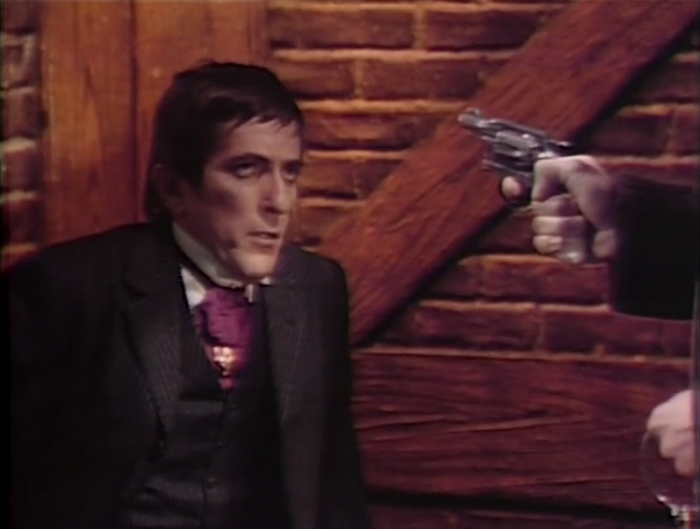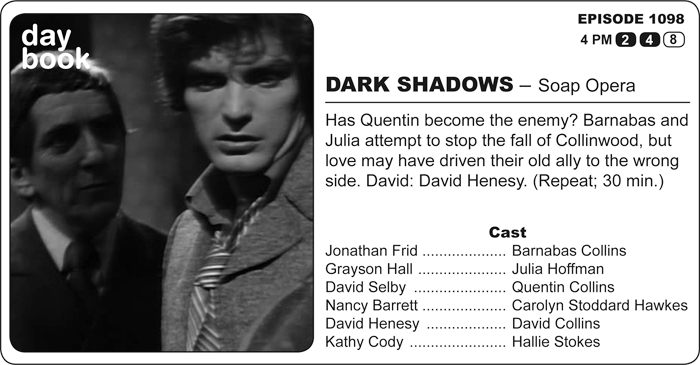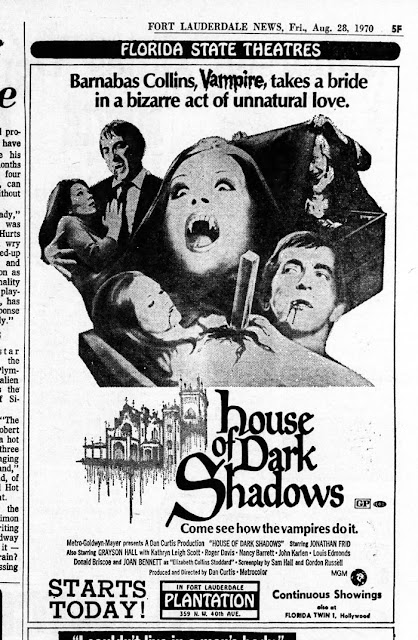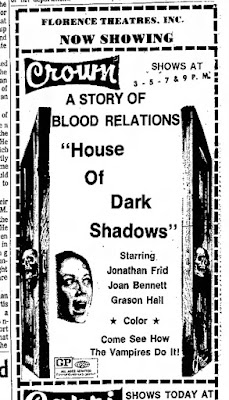By PATRICK McCRAY
Taped on this date in 1969: Episode 835
Edward, unable to kill Barnabas because he is a fellow Collins, locks him in a cell to await sunrise. Barnabas writes a letter to Julia and places it in a secret compartment, which is conveniently triggered and revealed by Amy in 1969. Julia and Stokes determine that she should go back in time to save Barnabas, but they need Amy to communicate with the spirits of Quentin and Beth for guidance.
On every level, this is one of the most conceptually revolutionary, nay, badass episodes of DARK SHADOWS ever conceived. Gordon Russell again delivers, and not just for the DARK SHADOWS franchise. 835 contains what may be his cleverest plot twist, and it’s one that was borrowed by Nicholas Meyer in TIME AFTER TIME (with the same furniture, no less) and STAR TREK IV: THE ONE WITH THE WHALES, as well as Robert Zemeckis and Bob Gale in BACK TO THE FUTURE II. Barnabas leaves a letter for Julia in 1897 that’s (of course) received at the most crucial moment possible in 1969. If it weren’t for the earnestness of the actors, the whole thing would fall apart into a coincidence that would make even Dickens wince, but Grayson Hall and Thayer David do what they invariably do -- pull it off. It continues the one, wacky consistency of time travel in DARK SHADOWS, too; it’s all somehow concurrent. The possibility of Julia going back before Barnabas encountered Edward is never mentioned. And they don’t mention it to such a conspicuous extent that it’s easy to buy that it’s not possible. We, as viewers, also aid the storytelling. We want to see Barnabas saved. We want to see what happens when Julia mixes it up in the 1890’s. It’s a storytelling move too generous to limit by causality and common sense. If I wanted that, I’d watch the news. Come to think of it, there’s more of it on DARK SHADOWS.
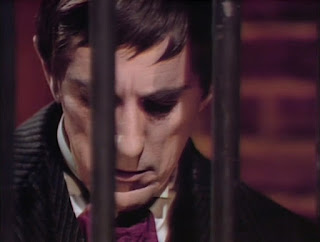 Aside from killing her own evil twin in Parallel Time and faking her way through the 1840’s, where she knew no one, this is Julia Hoffman at her most stone cold. Even Stokes is a little weirded out by the concept of time travel with no receptacle. But Julia sees no other way. Is it love? Is it a sense of mission? The answer is both ‘yes’ and ‘who cares?’ It’s Julia Hoffman’s time stream, and we just swim in it, baby. And in a manner that would make Qui Gon Jinn proud, all it takes is jeopardizing a psychically sensitive child’s life to gather the intelligence she needs. It’s about time Amy earned her keep. Go into Collinwood and talk to an evil specter with a penchant for casting death spells on children, already, and stop with the noise. Roger’s new Muscle & Fitness arrived in the mail, and he hates being disturbed on that day of the month. And make it snappy. I have two shows in Vegas, or should I say, in 1897 tonight.
Aside from killing her own evil twin in Parallel Time and faking her way through the 1840’s, where she knew no one, this is Julia Hoffman at her most stone cold. Even Stokes is a little weirded out by the concept of time travel with no receptacle. But Julia sees no other way. Is it love? Is it a sense of mission? The answer is both ‘yes’ and ‘who cares?’ It’s Julia Hoffman’s time stream, and we just swim in it, baby. And in a manner that would make Qui Gon Jinn proud, all it takes is jeopardizing a psychically sensitive child’s life to gather the intelligence she needs. It’s about time Amy earned her keep. Go into Collinwood and talk to an evil specter with a penchant for casting death spells on children, already, and stop with the noise. Roger’s new Muscle & Fitness arrived in the mail, and he hates being disturbed on that day of the month. And make it snappy. I have two shows in Vegas, or should I say, in 1897 tonight.Julia once again almost spills the truth to Stokes about Barnabas, but he’s too good a man to be entrusted with that news. She twists in the wind once again, and given the perceptiveness of the professor, her hornswaggling is all the more impressive. What would have happened if Stokes had found out? Would his sense of morality have been meta enough to appreciate the big picture that Barnabas was a victim of ‘coicumstance’? It’s hard to say, but Julia is the one character man enough to beat him again with a successful bluff… and she’s still all woman.
Not that Louis Edmonds and Jonathan Frid don’t share about their most butch moment on the series together in this one, because they do. In a Victorian way. Barnabas talking Edward out of plugging him with a silver bullet is masterful reasoning. So few relatives, even in his own time, take being a Collins seriously. Barnabas finds the one other within earshot, and it works… enough. It works. With the exception of maybe Liz and Joshua, he was lucky enough to be held at gunpoint by the one member of the family for whom ‘not harming a Collins’ has merit. Because, dammit, Barnabas is the same way. A moment like that would have been tough to pull off in the 1960’s. Leave it to DARK SHADOWS to create its own spinoff within itself, where a move like that is the only one possible. Sometimes, as Julia shows and Edward discovers, we have no other choice. But the age of EDWARD COLLINS: VAMPIRE HUNTER is only beginning.
This episode was broadcast Sept. 5, 1969.

